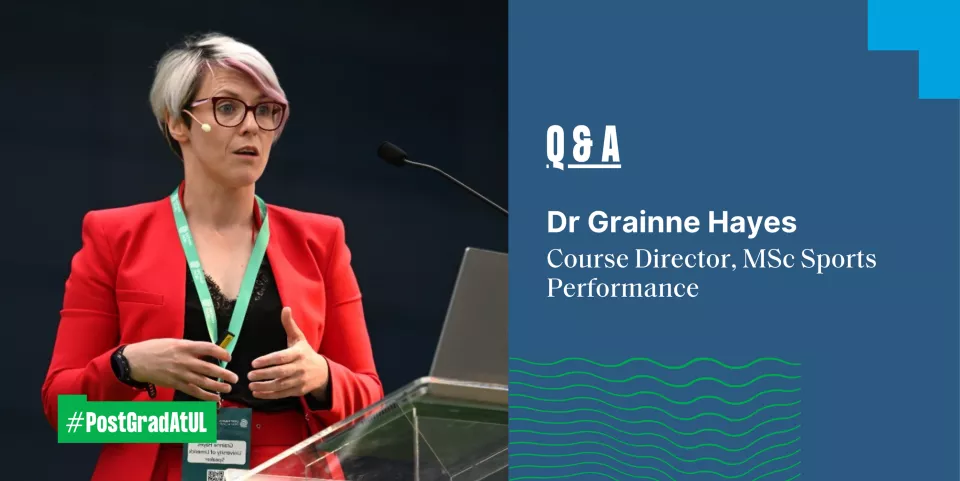

Dr. Gráinne Hayes, an Assistant Professor in Exercise Physiology at the University of Limerick, holds a BSc in Sport and Exercise Sciences and a PhD focused on physical activity and cardiometabolic health in youth. With extensive experience as a lecturer and researcher, she has contributed to various roles in academia, including at the Technological University of the Shannon, before returning to UL as a lecturer in the PESS Department.
What inspired you to pursue a career in Sports Science, and how has your own background shaped your role as Course Director?
I was inspired to pursue a career in exercise physiology by my deep interest in understanding how the human body responds and adapts to exercise. My passion for promoting health and well-being through evidence-based strategies led me to specialise in the measurement of physical activity behaviours, recognising their profound impact on preventing chronic diseases and enhancing quality of life. This foundation, combined with my background and experiences in sports performance, has shaped my role as Course Director by instilling a commitment to bridging the gap between research and practice, empowering students to translate scientific knowledge into real-world applications that benefit individuals and communities.
Can you share something interesting with us about your research?
An interesting aspect of my research is examining how the use of technology can enhance sports performance. For instance, I’ve explored how wearable devices, and digital tools provide real-time data to optimise training, coaching, prevent injuries, and track progress over time. It’s exciting to see how technology not only benefits elite athletes but also empowers individuals of all levels to engage in physical activity more effectively and sustainably.
What sets this programme apart from similar courses at other universities?
Since its inception in 2012, our MSc in Sports Performance has been a trailblazer in Ireland, winning the 2019 GradIreland Higher Education Award for Best Postgraduate Course in the Health Science Category. Our mission is to cultivate sports practitioners who possess a comprehensive understanding of advanced practices in sports performance analysis, encouraging them to question current methods and design creative solutions.
Are there any unique features or modules within the programme that students should be excited about?
The MSc in Sports Performance, offers graduates not only a Level 9 MSc but the course also includes
Accredited certification from Certified Strength and Conditioning Specialists® (CSCS®).
Video Analysis International Society of Performance Analysis in Sports (ISPAS)
International Society for the Advancement of Kinanthropometry (ISAK)
‘Cardiac First Response’ (AED) Programme
Are there opportunities for students to engage in research, group projects, interdisciplinary work, or practical experience such as internships during the course?
As part of the curriculum, students gain invaluable experience in high-performance environments prior to graduation. The placement programme allows students to establish professional connections across various sectors while developing essential skills for their future careers. Our strategic partners and organisations offer both local and international placements, including opportunities with Statsports, GAA, Sport Ireland, Oxford United FC, Rugby Canada, Western Province Rugby/Stellenbosch Academy of Sport, Oriam Scotland, Triathlon Ireland, and Munster & Connaught Rugby, among others.
What skills or knowledge will students gain that are highly valued in the industry or field?
Our programme fosters both broad and specialised knowledge in sports performance. Its interdisciplinary approach reflects best practices across various sports domains, integrating theoretical, laboratory, and applied learning in a top-tier educational environment equipped with cutting-edge technologies. Students delve into taught modules that enhance their understanding of sports performance theories and practices, research methodologies, reflective practice, and critical analysis skills. The skills and knowledge acquired here are globally relevant, making our program appealing to an international audience.
Core Modules Include:
Qualitative Research Methods
Speed Sports
Endurance Sports
Team Sports
Strength Sports
Professional Competencies (Problem-Based Learning)
Research Dissertation Development
Placement Opportunities
Strength & Conditioning (Professional Accreditation)
Research Dissertation (Students can exit with a graduate diploma if they choose not to complete the dissertation, and those interested in pursuing a structured PhD at UL can do so.)
What type of candidates are you looking for, and what attributes or experiences make a successful student in this programme?
We offer two pathways for admission to this programme. The standard route is for applicants with a recognized BSc 2:2 honours degree (Level 8 – National Qualifications Authority of Ireland) or higher, preferably in a related discipline such as sport and exercise sciences, physical education, strength and conditioning, kinesiology, physiotherapy, nutrition, or biomedical sciences.
Alternatively, we welcome applicants without a related degree who can demonstrate significant experience in high-level sports participation or coaching/mentoring athletes in high-performance environments. This Recognised Prior Learning (RPL) route requires a supporting statement of up to 1,000 words to be submitted with the application. Significant supplementary evidence of relevant experience must also be included.
Online applications for the program beginning in January 2025 will remain open until the end of December. Admission is based on the online written application, with no interview required. For any additional information about the course or the application process, please feel free to reach out grainne.hayes@ul.ie.
Curious about the MSc in Sports Performance?
